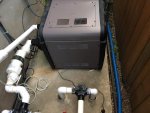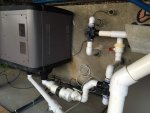Hayward Heater Leaking again
- Thread starter jonmar
- Start date
You are using an out of date browser. It may not display this or other websites correctly.
You should upgrade or use an alternative browser.
You should upgrade or use an alternative browser.
So here's the thing. When I had the heater replaced, Hayward sent a tech to inspect my install to see if there was an issue with it. Checked for bonding and water flow etc. Never said a word about a check valve. Is that a legitimate gripe I have with them or just replace it and get a check valve put in?
jkayca
0
You may have a case as a check valve should have been installed. It should have been installed with the first heater and definitely when the second was installed. When my Raypak was installed, the guy specifically asked if a check valve was present.
You can try and argue with Hayward. What have you to lose? The fact that you have chemistry logs and a missing check valve are in your favor. Ask them if they stand by their products. This is your second Hayward heater on its way out only after 4 years.
You can try and argue with Hayward. What have you to lose? The fact that you have chemistry logs and a missing check valve are in your favor. Ask them if they stand by their products. This is your second Hayward heater on its way out only after 4 years.
Any chance anyone has a Hayward installation manual from 2009? I'd like to know if the requirement for a check valve was in the manual when my pool was built.
Yes while it is stated in the manual about installing a check valve, it is not listed as mandatory. It does not state that your warranty will be void if not installed either. Heck I would have to say that maybe 1 in 100 systems I work on have a check valve on the return side of the heater. I do not see this as an issue not having a check valve especially on a salt chlorinated pool. On a regular puck system depending on the location it should be installed. I will also saw this, I have replaced Hayward units that are between 11 and 18 years old and have no check valve. These are units that were pretty much bullet proof and the reason I am replacing them is that they have rusted themselves out. The heat exchanger is still in decent shape.
As for Hayward, I and others have been preaching for years about these new FD heaters. They are garbage and people keep buying them. They have known issues and I firmly believe Hayward knows about the issues and refuses to do anything about them. Just like the ID units they produced, they are problem prone.
Do yourself a favor, if you truly have a leak, get rid of the Hayward and buy a Raypak.
As for Hayward, I and others have been preaching for years about these new FD heaters. They are garbage and people keep buying them. They have known issues and I firmly believe Hayward knows about the issues and refuses to do anything about them. Just like the ID units they produced, they are problem prone.
Do yourself a favor, if you truly have a leak, get rid of the Hayward and buy a Raypak.
Spoke to Hayward. They are sending someone to look and diagnose if it's actually a leak. At first they wanted me to pay for it and I said if this was a one off I would. Given its the fourth time I don't need to pay someone $200-300 to learn my heat exchanger is leaking. Hayward guy said a missing check valve wouldn't cause the problem and that although the manual calls for one you don't really need it. I don't think that's correct.
Can you take and post a pick of your setup? It is not mandated that a check valve be installed.
So I got home today and for the first time since the weekend the leak stopped. I know it was pool water because the test strip I put in the drip changed to match one dipped in the pool. So I'm not sure why it was a heavy leak for four days and now nothing. The heater hasnt been run since Friday. Anyway, here are two pics of my setup.



You don't even have room in your piping for a check valve. Very tight in that area. That unit is prone to leaks just like I said.
Hayward sent a local tech and before looking at anything said its water chemistry. Told him I'd already learned my lesson on that so I'd like him to look closer. He took it apart and checked the install. Said it wasn't 'best practice'. The water flow sensor isn't where it should be. No check valve. Wiring doesnt turn off the salt cell when the pump is turned off. Said the gas flow is marginally off. Says the damage to the HE is partly from caustic water, meaning high ph.
So he thinks they all contribute but doesn't know the weighting to give. Although the last thing he said was 'when you buy a car and don't look after it it won't last'.
I'm at a loss. I must know 10 people with a pool. No one is neurotic about their water like I am and I'm the only one with issues. How on earth can Hayward products require so much minute management for chemistry? Checking every other day isn't enough I guess. Anyway, I'll wait for Hayward to get their report and blame me. Then I'll price out raypaks.
So he thinks they all contribute but doesn't know the weighting to give. Although the last thing he said was 'when you buy a car and don't look after it it won't last'.
I'm at a loss. I must know 10 people with a pool. No one is neurotic about their water like I am and I'm the only one with issues. How on earth can Hayward products require so much minute management for chemistry? Checking every other day isn't enough I guess. Anyway, I'll wait for Hayward to get their report and blame me. Then I'll price out raypaks.
I'll say it till I'm blue in the face, Hayward has a problem with their new units. 99% of the time it is NOT water chemistry. They all leak in the same place. They will never admit it though.
I would look into seeing if you can re-arrange things on your equipment pad though. You are cramped for space. Not sure what is on the other side of the fence but if you can expand it and change the direction of which the heater sits so you can pipe it better will help.
I would look into seeing if you can re-arrange things on your equipment pad though. You are cramped for space. Not sure what is on the other side of the fence but if you can expand it and change the direction of which the heater sits so you can pipe it better will help.
I'm going to absolutely redo the setup for the piping. I'm going to also price out the raypak. Are the older model Hayward junk too?
Just so I know before speaking with Hayward, in theory, can high ph cause a leak in a heat exchanger? I can see understand scaling and reduced efficiency but it's not corrosive. I was looking and haven't found anything about leaking heat exchangers unless it's low ph.
Thread Status
Hello , This thread has been inactive for over 60 days. New postings here are unlikely to be seen or responded to by other members. For better visibility, consider Starting A New Thread.

